[GSE 2022] An Active Response to the Learning Crisis and a Joint Exploration of the Futures of Education ——The Successful Accomplishment of the GSE 2022 “Student Forum on Learning Crisis and Futures of Education”
date:2022-08-31 16:27author:adminsource:Smart Learning Instituteviews:
During its 120th anniversary, Beijing Normal University hosted the GSE 2022 “Student Forum on Learning Crisis and Futures of Education”. The forum was held in its Changping Campus in the afternoon of August 19. Based on the actual situation of their countries and regions and combined with their own experiences, 15 outstanding university student representatives from China, Malaysia, Bangladesh, Serbia, South Africa, Tunisia, Uganda, and Nigeria shared their understanding of the learning crisis and their expectations for the futures of education from four dimensions:
1.learning environment reform2.learning method innovation
3.rural student training
4.inclusive education realization
Several guests of honor attended the conference, including SONG Weizu, who is Founder of Beijing Design Society and Deputy Director of the Central Cultural Committee of the China Democratic League; Tatiana Shutova, Programme Specialist at UNESCO IITE; Danimir Mandic, Dean of Teacher Education Faculty, University of Belgrade, Serbia; CHEN Guangju, Vice Director of the University Council, Beijing Normal University; NI Jiaqi, Deputy Secretary of Youth League Branch Committee, Beijing Normal University. WANG Huanhuan, Boulus Shehata, and Michael Agyemang Adarkwah from Beijing Normal University and BAO Haogang from National Institute of Education Sciences co-chaired the Forum. The Forum was held online and onsite and live-streamed to domestic and overseas audiences through many media outlets.
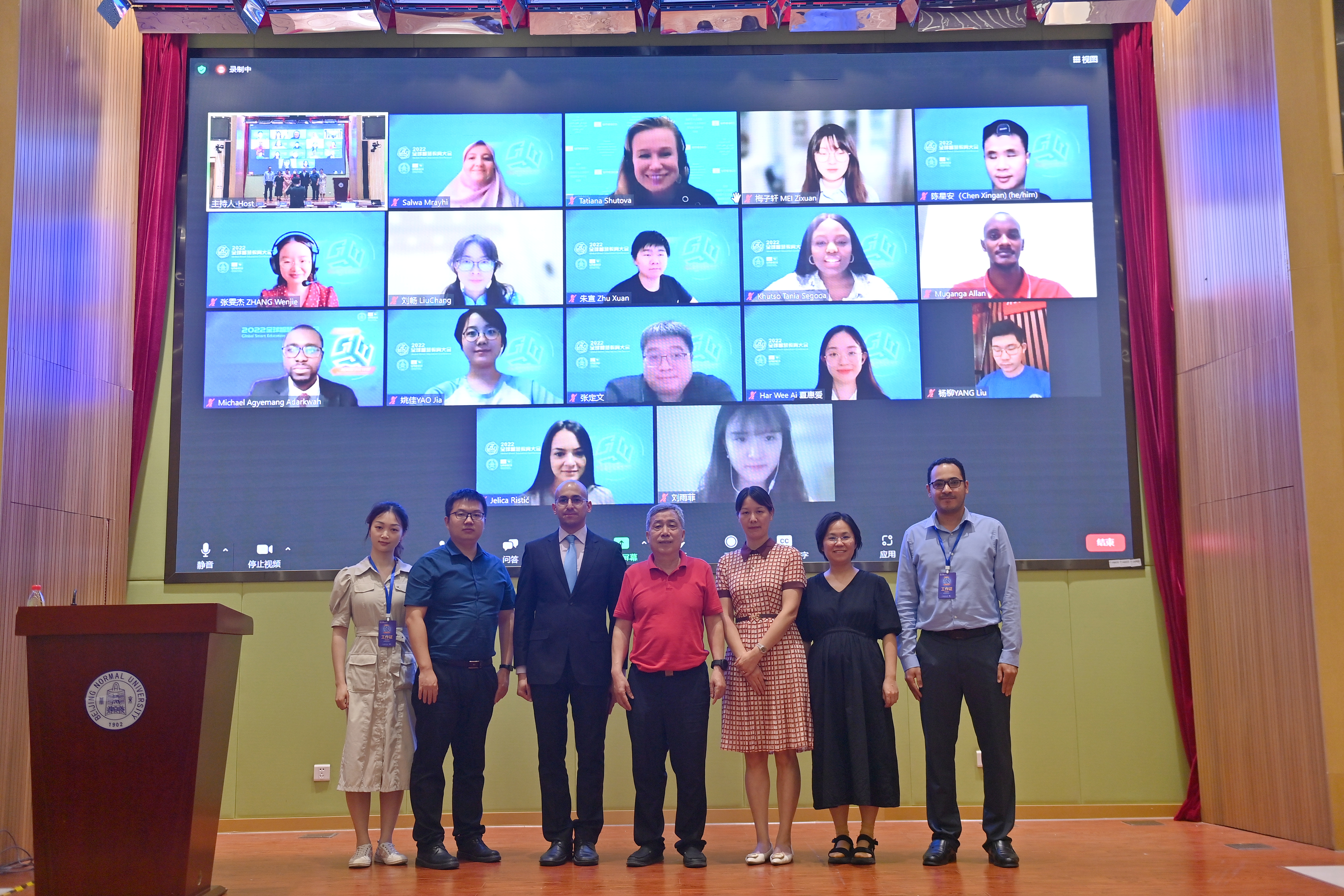
Group Photo of Forum Attendees
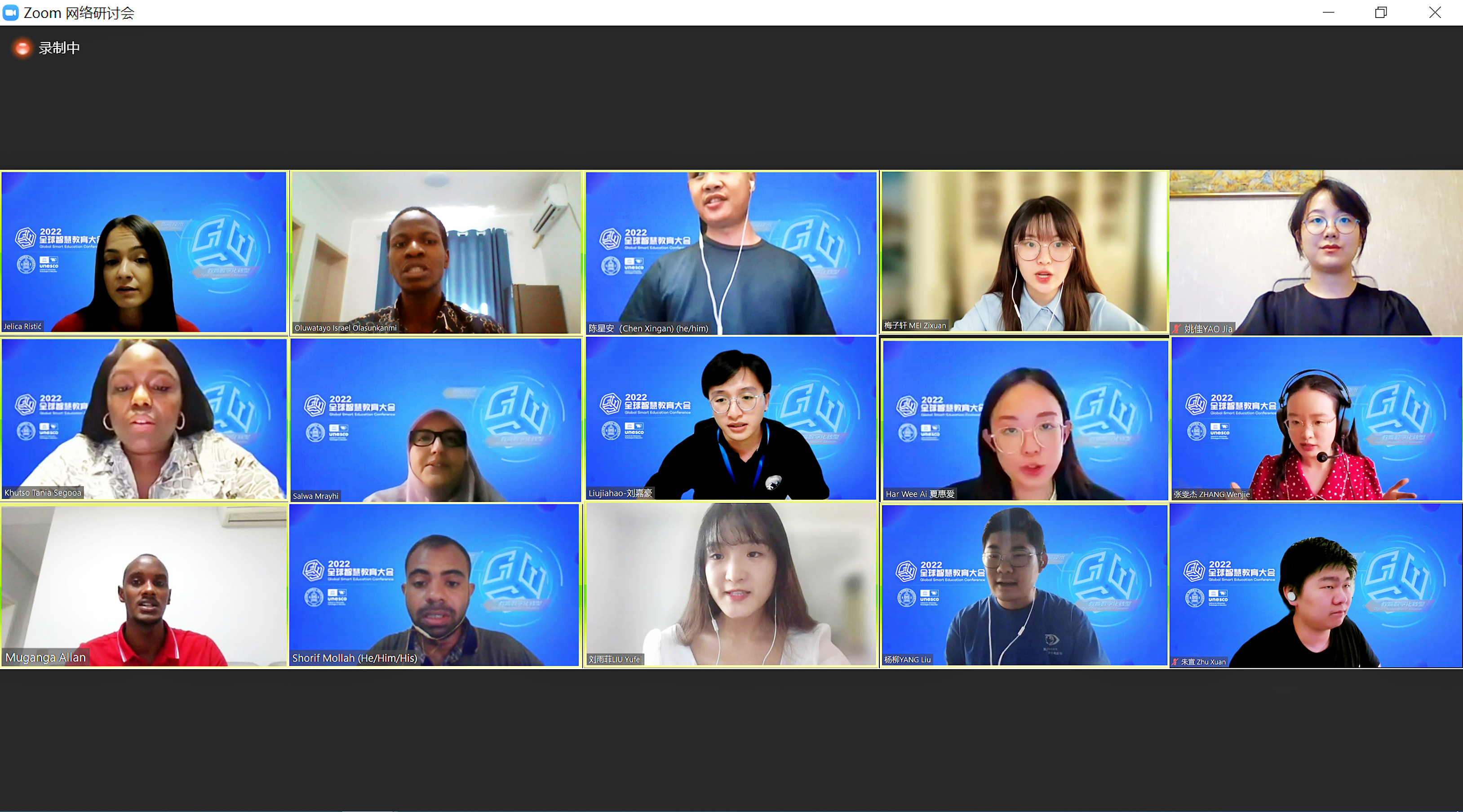
University Student Representatives
Transforming learning environments to solve the learning crisis
It is one of the learning crises in the world that learning in schools may not necessarily acquire the required knowledge and skills. The learning environment needs to be developed, and the education ecosystem, school form and teaching methods need to be developed accordingly. Governments, schools, families and the whole society need to work together to promote the digital transformation of education to help students acquire the abilities needed in the fourth industrial revolution.
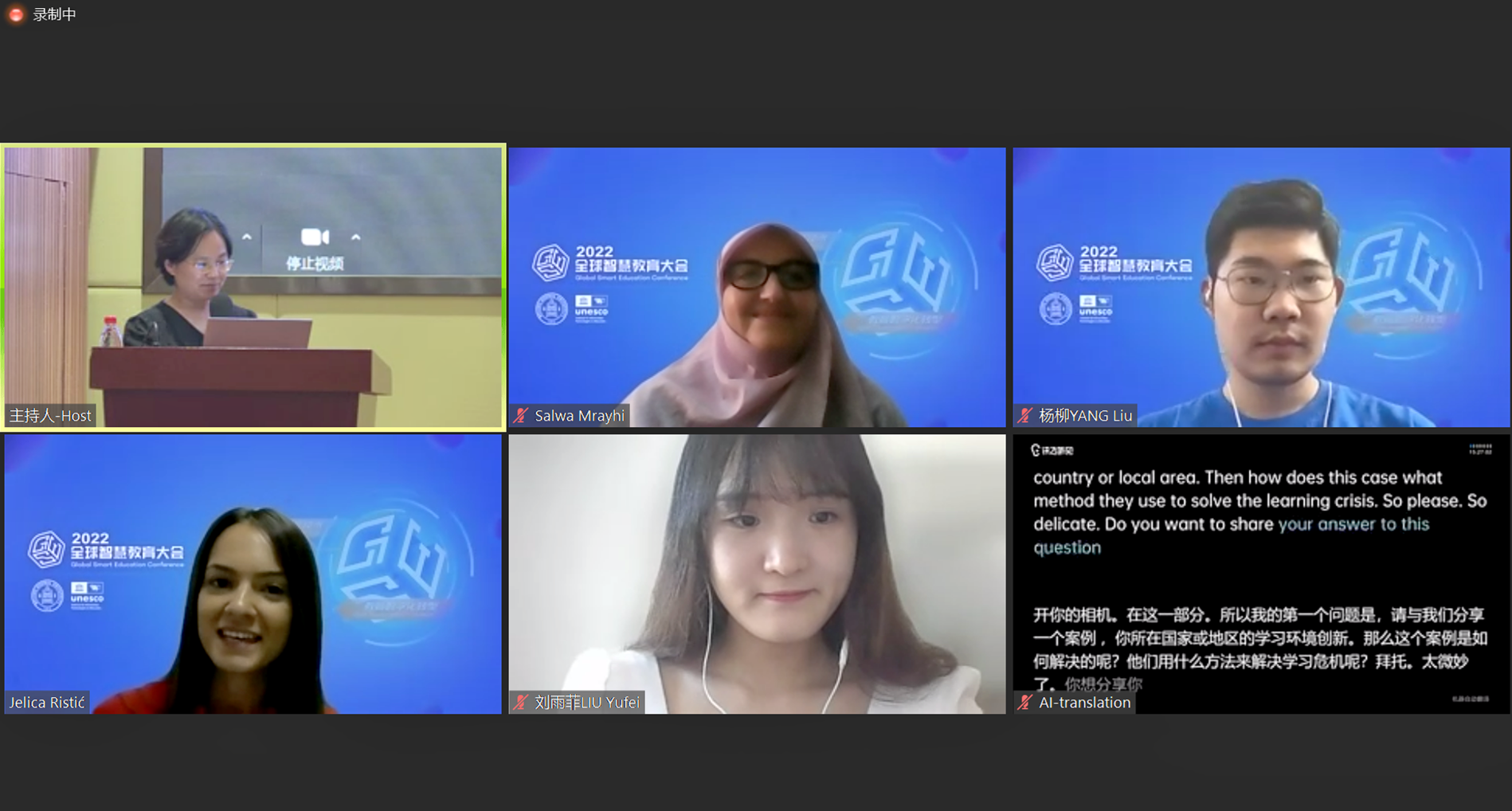
Learning environment transforming issues
LIU Yufei from Beijing Normal University held that it was a prominent learning crisis that students’ learning achievements do not match the future social needs. Moreover, teaching cannot support learners' development and well-being in the future, which requires the joint efforts of the school and the whole society to resolve. She mentioned that under the guidance of the concept of Outcomes-Based Education (OBE), we could systematically think and redesign the learning environment from the perspectives of teaching objectives, teaching contents and teaching evaluation, so as to promote students' flexible, active and spontaneous learning, and thus improve their comprehensive ability required in the future.
Jelica Ristić from the University of Belgrade recalled that during the COVID-19 pandemic, students' obstacles to self-identity and teachers and students' inability to adapt to the rapidly developing digital learning environment are the crises that we must pay attention to. A blended learning environment and teacher training services are one of the solutions to overcome the crisis. The blended learning environment carried out by the University of Belgrade in the form of Flipped Class Model had proved its important role in improving the learning experience, enhancing the interaction between teachers and students, and improving the overall learning. Based on the Edmodo learning platform, she and her team designed a Metaverse Application Skills Improvement Program to help teachers conduct daily teaching, online teaching and B-teaching in the metaverse.
Salwa Mrayhi from Virtual University of Tunisia held that it was a great crisis that teachers and students cannot complete effective learning in the digital learning environment, and that governments and schools need to implement the digital learning environment strategy. She proposed to provide teachers with rich tools and necessary training. Her team designed a system framework of massive open online courses (MOOC), aiming to provide personalized learning and support for students to improve their learning efficiency.
YANG Liu from Beijing Normal University emphasized that it was a major crisis that the traditional classroom is not suitable for students' equal exchange and effective learning, and the widespread application of new technologies may cause privacy and ethics problems. He said that school should be a friendly, open, free, inclusive, fair, safe and healthy place. The application of intelligent technology must be people-centered and it is essential to build a student-centered learning space. He worked with his team to design an immersive future classroom based on an intelligent interactive system (Illusion), which provides space for equal communication and cooperation between special children and ordinary children, so as to achieve educational equity.
Developing learning methods to solve the learning crisis
Education is at a critical stage of digital transformation, and technology-based learning methods emerge in an endless stream. However, “using technology just for the sake of technology” has brought new learning crises. The innovation of learning methods should help students improve their interest in learning, involve in the process of learning, and cultivate them to shape their future “transformative attainment”. This is about creating new values, assuming responsibilities, mediating pressure and coping with difficulties, all from the perspective of promoting people's all-round development.

Learning methods developing issue
ZHANG Wenjie from the University of Hong Kong mentioned that students' poor learning skills and poor learning quality were a major crisis at present, and students' skills for the 21st century should be improved through online education. She said that the frequency and level of students' classroom questioning could reflect their cognitive level. Therefore, she worked with her team members to design a software that automatically analyzes students' classroom questioning, which can provide visual analysis charts and feedback reports. Teachers can provide guidance according to the data, so that students can be good at asking questions and improve their metacognitive ability.
Oluwatayo Israel Olasunkanmi from Chongqing University pointed out that the uneven quality of education in various countries in the world was one of the current learning crises. In particular, many school-age children in low-income countries do not have the basic skills of reading and calculating numbers. Moreover, teachers cannot get the support and development they deserve. He believed that it was necessary to strengthen global cooperation, adopt digital learning to promote education equity, and train 21st-century skills for learners in low-income countries.
MEI Zixuan from Capital Normal University emphasized that students' failure to develop the transferable ability and general attainment was a major learning crisis, which would hinder students from integrating into the future society. She said that the direction of learning method innovation should be “making the world a classroom”. The situational learning method can create real problem situations, help students participate in the learning process, solve real problems through interdisciplinary knowledge, and cultivate students' abilities to shape the future.
YAO Jia from Beijing Normal University highlighted that the insufficient use of technology, lack of qualified teachers and insufficient access to high-quality education were the three major learning crises in China, and COVID-19 had brought challenges to educators. She believed that China's experience during the COVID-19 was worth promoting, such as building a reliable network infrastructure, using convenient learning tools and platforms, and providing appropriate digital learning resources. We should jointly build a community with a shared future in cyberspace and bridge the “digital divide” to cope with today's learning crises.
Developing competencies for sustainable development among rural students
Rural students lack sufficient resources during their study and life in general, and the learning crisis caused by dropouts, absenteeism and school-weariness make it worse. In the face of the complex and changeable future society, it is necessary to strengthen the close integration of education with rural economic development and social environment, cultivate students' sustainable development ability, and make full preparations for the effective integration of rural students and economic society.

Rural education issues
ZHU Xuan from the ArtCenter College of Design held that the lack of design thinking and innovation ability were major issues of the learning crisis faced by rural students. He mentioned that it was very important to make rational use of the natural resources in rural areas to create conditions for rural students. He worked with his team to design a low-cost rural students' design thinking educational project. Through three different spaces, students are allowed to operate experiments to design and create works based on local resources, which helps to cultivate students' curiosity, observation ability and practical ability.
Muganga Allan from Southwest University mentioned that the imbalance in education between urban and rural areas, and the serious shortage of teachers were the common challenges of the learning crises in Uganda. Some rural primary schools have only one teacher to teach all courses, and even many students have classes under trees. When it rains, the courses will be cancelled. He held that rural areas need basic facilities and Internet access, as well as enough teachers to ensure students receive formal education. All countries in the world need to work together to achieve the goal of “ensuring inclusive and equitable quality education and promoting lifelong learning opportunities for all”.
Shorif Mollah from Beijing Normal University mentioned that the lack of high-quality learning resources was a learning crisis in Bangladesh and other developing countries. Especially in rural areas, teaching is basically a teacher's oral and dictation process, which cannot cultivate students' sustainable development ability. He introduced an Open Educational Resources (OER) research project, and emphasized the importance of OER in achieving quality education for all and promoting the sharing of education resources.
LIU Jiahao from Beijing Normal University pointed out that it was the main crisis in education that teachers' application of technology was overloaded, and the effectiveness of technology application in education was questioned. He held that in the process of promoting sustainable development education in rural areas, we should not overemphasize technology. Instead, we should guide teachers to master basic technologies and apply them rationally and help students learn to deal with the relationship between themselves and the society, the world, the nature and ultimately make contributions to the overall social progress and development.
Integrating resources to achieve inclusive education
There are still several problems in the world that children with special needs face. Many do not have access to schools. Many girls are out of school due to gender discrimination Vulnerable groups do not receive high-quality education. During the COVID-19, the response measures of various countries did not take children with special needs into account. As a result, their basic learning and emotional needs could not be met. We need to make collective efforts and integrate various resources to ensure everyone's right to education.

Inclusive education issues
CHEN Xing'an from the Diablo Valley College held that the lack of barrier-free learning resources and fair employment opportunities for disabled people was one of the crises in achieving inclusive education. As a visually impaired person, he was considered unable to enter a university or have a good job from an early age. He faced many restrictions in primary and middle school stages. He proposed three solutions—community support, online learning programs and public-private partnerships programs to promote the formal learning and career development of the disabled.
Har Wee Ai, a postgraduate of Beijing Normal University, mentioned that the basic health services and education services in Malaysia did not include the disabled, and this exclusion and discrimination had brought a great crisis. She held that people should have a common understanding of inclusion and diversity. The United Nations International Children's Emergency Fund (UNICEF) in Malaysia has launched an inclusive playground for disabled children, which is a very good way to achieve emotional education. She worked with her team to design a metaverse education game called “Mind Forest Pro” for students aged 4-12 to promote the social and emotional learning of autistic children.
Khutso Tania Segooa from Fordham University highlighted that the students in special schools in South Africa had a serious lack of learning and did not have the basic reading and writing skills required for employment, which was a major crisis. She held that the disabled should be included in mainstream schools to study and communicate with the non-disabled. She proposed an APP with visual elements to support the understanding, expression and communication of speech-impaired children, and she hopes to use the APP as a bridge for interaction between speech-impaired children and teachers as well as classmates.
Future education envisioned by international university students
University students have their own imaginations about futures of education. They hope to achieve high-quality, inclusive and equitable education through innovative technology integration, ubiquitous learning, resource sharing, intelligent learning environment and effective teaching methods, so as to promote everyone's ability development and well-being and the sustainable progress of a harmonious society. The construction of a ‘Community with a Shared Future for Mankind’ is a key phrase repeatedly mentioned.
Students hope that technology can play a more important role in education. YANG Liu summarized the characteristics of future education with four keywords: ubiquitous, personalized, predictable, and dynamic. Allan hopes that technology in the future can be better integrated with education, and teachers and students can easily use technology for personalized learning, so as to truly cultivate students' basic skills for the 21st century. While LIU Jiahao hopes that with the support of technology, the future learning space will be everywhere and interconnected, with seamless connections between school, family and society, and that informal learning and formal learning will be organically combined.
In addition, some students hope that future education will be more inclusive. CHEN Xing'an expects that future education will enable every disabled people to have access to high-quality learning resources and employment opportunities. Khutso Tania Segooa hopes that the restriction of disabled children in education will be greatly reduced in the future, and that they can learn various useful skills in school to have better opportunities in the society. Har Wee Ai held that “promoting learning through design” can help us re-envision the world, and all professions can participate in creating inclusive infrastructures, products and services to create a quality life for mankind. Shorif hopes future education to be more inclusive, global and practical.
Some students hope that future education will be more equitable. LIU Yufei expects that in the future, everyone in the world can learn more flexibly and independently, and enjoy high-quality educational resources and educational fairness. Salwa hopes that future education will enable students to enjoy the learning process, realize personalized learning and lifelong learning, and transform the world into a more equitable and sustainable future. MEI Zixuan has a vision that future education will be more fair and equitable, so that everyone can enjoy a decent life.
In addition, some students hope that future education will be more inclusive. CHEN Xing'an expects that future education will enable every disabled people to have access to high-quality learning resources and employment opportunities. Khutso Tania Segooa hopes that the restriction of disabled children in education will be greatly reduced in the future, and that they can learn various useful skills in school to have better opportunities in the society. Har Wee Ai held that “promoting learning through design” can help us re-envision the world, and all professions can participate in creating inclusive infrastructures, products and services to create a quality life for mankind. Shorif hopes future education to be more inclusive, global and practical.
Some students hope that future education will be more equitable. LIU Yufei expects that in the future, everyone in the world can learn more flexibly and independently, and enjoy high-quality educational resources and educational fairness. Salwa hopes that future education will enable students to enjoy the learning process, realize personalized learning and lifelong learning, and transform the world into a more equitable and sustainable future. MEI Zixuan has a vision that future education will be more fair and equitable, so that everyone can enjoy a decent life.
Guests' Views
SONG Weizu, Founder of Beijing Design Society and Deputy Director of the Central Cultural Committee of the China Democratic League, pointed out that there were still some problems in education in today's world, such as dropouts, lack of teachers, difficulty in going to school and many more. The learning crisis caused by primitive educational knowledge and rigid teaching methods needs to be paid attention to. With the advent of the new era of innovation-driven development, the knowledge structure and knowledge learning content have developed in the direction of art, science and technology, and that they are complementing and completing each other. It has become a new trend to pay equal attention to knowledge and skills, interdisciplinary learning, and the unification of brains and hands.
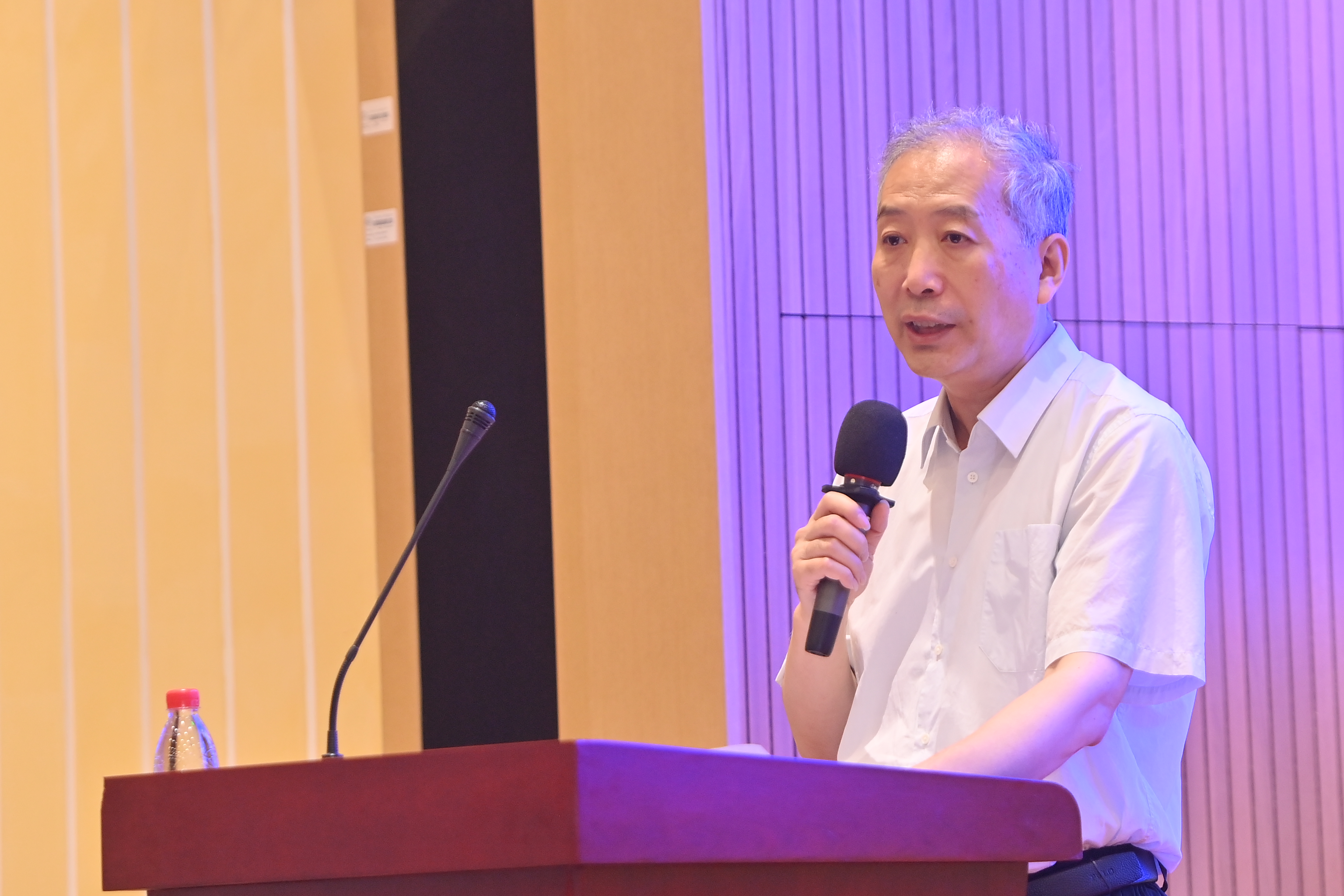
SONG Weizu, Founder of Beijing Design Society and Deputy Director of the Central Cultural Committee of the China Democratic League
On behalf of UNESCO IITE, Tatiana Shutova, a programme specialist, expressed a warm congratulation to Beijing Normal University’s 120th anniversary. She pointed out that UNECO IITE and BNU had been cooperating in many projects, especially the concluded 5th Global Competition on Design for Future Education, in which a number of unique university students' projects and primary and secondary school teachers' cases have been produced, and some of them have been included in the UNESCO E-Library For Teachers. Built by UNESCO IITE and NetDragon, E-Library For Teachers has effectively solved the problems of teachers' lack of professional knowledge and rigid teaching methods, helped teachers master new technologies, improved their teaching ability, and provided effective solutions for education and teaching.

Tatiana Shutova, a Programme Specialist of UNESCO IITE
Danimir Mandic, who is the Dean of Teacher Education Faculty at the University of Belgrade in Serbia, mentioned that in response to the learning crisis, future education should make full use of the advantages of AI technology to innovate teaching methods and improve teachers' ability. On one hand, it can analyze and reorganize the knowledge structure to improve students' learning motivation, and on the other hand, through training, seminars and other forms, it can help teachers master new technologies and improve their teaching ability.
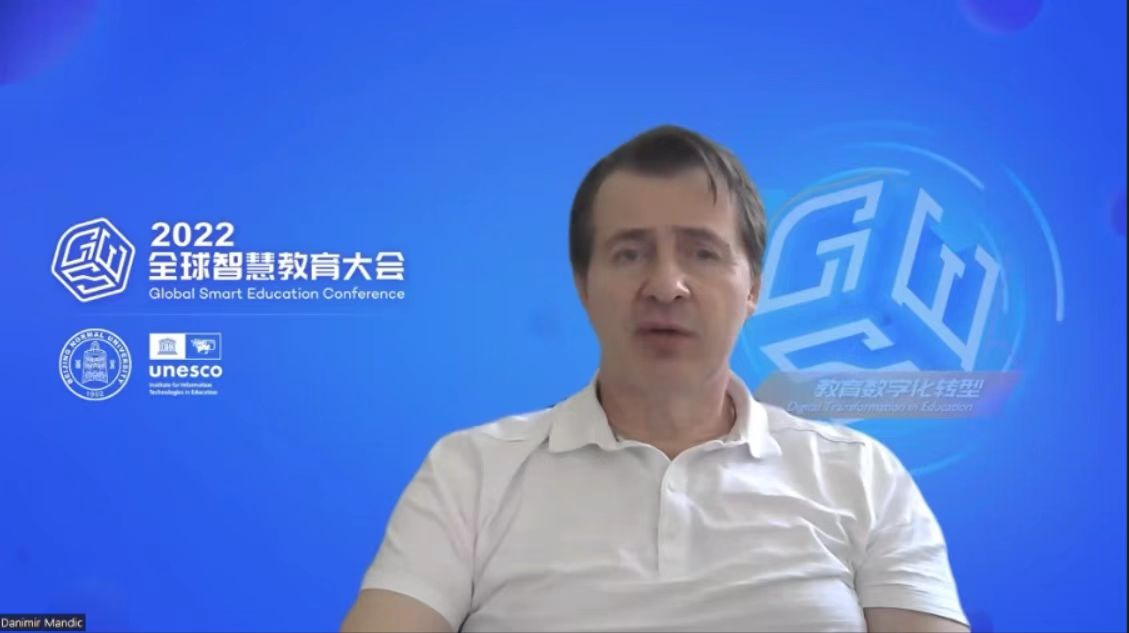
Danimir Mandic, Dean of Teacher Education Faculty, University of Belgrade, Serbia
NI Jiaqi, who is Deputy Secretary of Youth League Branch Committee, Beijing Normal University, mentioned that the learning crisis was complex. Some people do not have the conditions for learning; some have good conditions but are not interested in learning; and some are interested in learning but lack effective learning methods. These problems are closely related to the futures of education and the development of human society. Education is an effective way to eliminate poverty and promote social progress. It plays an important role in building a ‘Community with a Shared Future for Mankind’. University students are the backbone of future social development. They have knowledge, dreams and a sense of social responsibility. In his congratulatory letter to the World Youth Development Forum, President Xi Jinping pointed out that “the youth of all countries should carry forward the shared values of humanity’s peace, development, equity, justice, democracy and freedom; to promote the global development initiative with practical actions; to help implement the UN 2030 Agenda for Sustainable Development; and to jointly write a new chapter in the era of solidarity and cooperation among the world's youth”. She looks forward to building a platform through the Forum so that university students from all over the world can perceive the crisis, exchange and learn from each other, and achieve common development.

NI Jiaqi, Deputy Secretary of Youth League Branch Committee, Beijing Normal University
This Forum was jointly organized by the Student Union and Graduate Student Union of Beijing Normal University, UNESCO IITE, Beijing Design Society, Teacher Education Faculty, University of Belgrade, Serbia, and Smart Learning Institute of Beijing Normal University.

